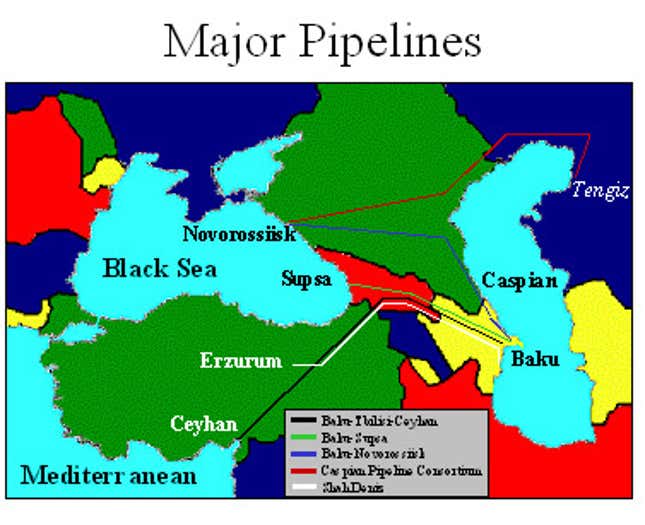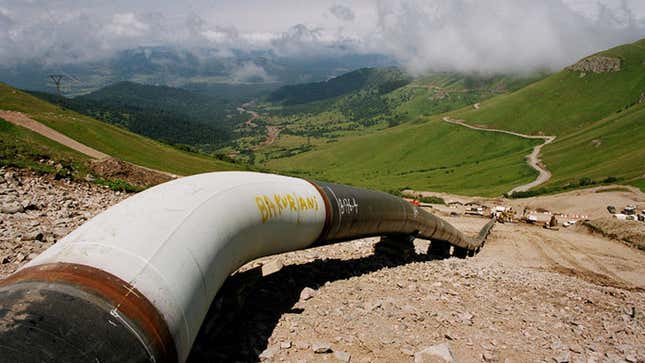Moscow has escalated its brinksmanship with the West, reopening a monumental 1990s clash over an oil pipeline that it fought and lost with the United States.
The new front is Georgia, a Russian neighbor that’s been a theater of US-Russian struggle since the mid-1990s.
Back then, Washington promoted the construction of oil and natural gas pipelines in former Soviet republics independent of Russian control. The objective was to help wrest Georgia and Azerbaijan from Russian political domination by loosening Moscow’s long-held economic stranglehold on the Caucasus region.

Since Russia was much weaker politically at the time, the US managed to best Moscow—the lines were constructed, thus eliminating Russia’s monopoly on the flow of oil and gas from the Caucasus. The biggest blows to Russia were two of the pipelines in this drawing, depicted by the green and black lines: BP-operated pipelines from Baku to the Georgian port of Supsa, and from Baku to the Turkish port of Ceyhan.

Here is a photo of Baku-Ceyhan under construction in the early 2000s. The first oil tankers were loaded in 2006.
None of this sat well with Russian president Vladimir Putin. In 2008, he sent the Russian Army into Georgia, ostensibly only to stop the slaughter of South Ossetians by Georgian artillery. But Putin’s generals proceeded to bomb and capture a wide swath of territory. Before withdrawing, Russia dropped 45 bombs all around the Baku-Ceyhan pipeline. The message of the entire operation: Georgia remained a subject of Russia, pipelines or no pipelines.
Now, Putin appears to have taken a new step. On July 13, Georgia accused Russia of putting up barbed wire fencing about a mile outside the South Ossetian border, including signs claiming the land part of the Russian protectorate.
For BP and US geostrategy, the land grab was ominous—a mile-long section of the Baku-Supsa pipeline is contained within the newly annexed territory.
Carefully avoiding any mention of the Russian operation, BP says it has intended for some time to rebuild parts of the pipeline, including getting rid of the section now held by Russia.
It remains to be seen whether BP’s ignore-the-ruffian strategy works, or simply goads Putin into more brinksmanship. European Council president Donald Tusk called Russia’s move a “provocation.” Richard Hoagland, US deputy assistant secretary of state, said the US is monitoring the situation.
For now, Georgia seems to be a new front in the Ukraine crisis.
“I believe that [Putin’s] strategic objective is to reverse all ‘gains’ the US/West has achieved at the expense of Russia since the breakup of the USSR,” Richard Kauzlarich, who was US ambassador to Azerbaijan in the mid-1990s and now teaches at George Mason University, told Quartz.




